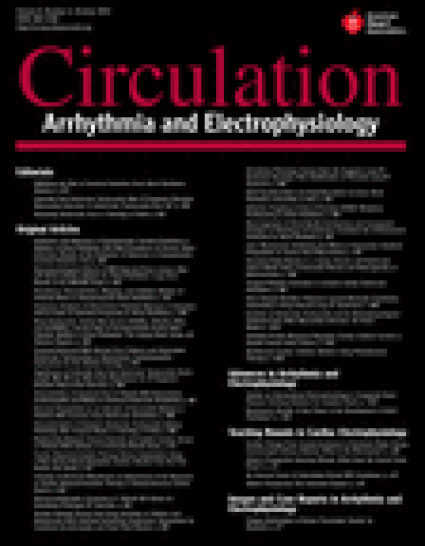
Article
Both Hypothyroidism and Hyperthyroidism Increase Atrial Fibrillation Inducibility in Rats.
Circulation-Arrhythmia and Electrophysiology
(2013)
Abstract
Background:
Evidence indicates that cardiac hypothyroidism may contribute to heart failure progression. It is also known that heart failure is associated with an increased risk of atrial fibrillation (AF). Although it is established that hyperthyroidism increases AF incidence, the effect of hypothyroidism on AF is unclear. This study investigated the effects of different thyroid hormone levels, ranging from hypothyroidism to hyperthyroidism on AF inducibility in thyroidectomized rats.
Methods and Results:
Thyroidectomized rats with serum-confirmed hypothyroidism 1 month after surgery were randomized into hypothyroid (N=9), euthyroid (N=9), and hyperthyroid (N=9) groups. Rats received placebo, 3.3-mg l-thyroxine (T4), or 20-mg T4 pellets (60-day release form) for 2 months, respectively. At the end of treatment, hypothyroid, euthyroid, and hyperthyroid status was confirmed. Hypothyroid animals showed cardiac atrophy and reduced cardiac systolic and diastolic functions, whereas hyperthyroid rats exhibited cardiac hypertrophy and increased cardiac function. Hypothyroidism and hyperthyroidism produced opposite electrophysiological changes in heart rates and atrial effective refractory period, but both significantly increased AF susceptibility. AF incidence was 78% in hypothyroid, 67% in hyperthyroid, and the duration of induced AF was also longer, compared with 11% in the euthyroid group (all P<0.05). Hypothyroidism increased atrial interstitial fibrosis, but connexin 43 was not affected.
Conclusions:
Both hypothyroidism and hyperthyroidism lead to increased AF vulnerability in a rat thyroidectomy model. Our results stress that normal thyroid hormone levels are required to maintain normal cardiac electrophysiology and to prevent cardiac arrhythmias and AF.
Keywords
- atrial fibrillation,
- electrophysiology,
- thyroid hormones,
- arrhythmias,
- cardiac
Disciplines
Publication Date
October 1, 2013
DOI
https://doi.org/10.1161/CIRCEP.113.000502
Citation Information
Youhua Zhang, Eduard I. Dedkov, Diana Teplitsky, Nathan Y. Weltman, et al.. "Both Hypothyroidism and Hyperthyroidism Increase Atrial Fibrillation Inducibility in Rats." Circulation-Arrhythmia and Electrophysiology Vol. 6 Iss. 5 (2013) p. 952 - 959 Available at: http://works.bepress.com/edward-dedkov/12/
